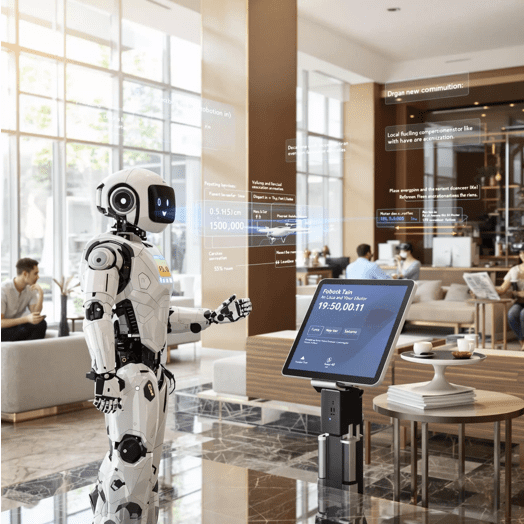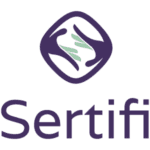Artificial Intelligence is expected to have a profound impact on the travel and hotel industries as reported by the 2024 Customer Engagement Technology Study. For travelers, AI offers a powerful tool to enhance decision-making and personalize experiences. For hoteliers, embracing AI can lead to improved guest services and more efficient operations. Hotel Communication Network (HCN), a provider of interactive in-room tablets, is leveraging AI to enable guests to request services, communicate their needs, place F&B orders from local restaurants, control the room environment and more via voice commands in multiple languages.
This week at The Hospitality Show in San Antonio, hotel operators can engage with HCN’s AI-powered Navigator 2.0 tablets in Booth #1755 at the Henry B. Gonzalez Convention Center. Called AiMe (pronounced Amy), the AI Concierge uses natural language processing to respond to guests’ unstructured requests and creates actionable tasks that can be relayed from the tablet to the hotel’s service system and then to staff.
“Today’s travelers are quite comfortable using consumer-grade generative AI (such as ChatGPT and Perplexity), and soon they will expect it to be a standard part of their hotel experiences,” said HCN Chief Product Officer Neil Schubert. “When asked how they would use generative AI before, during, and after their hotel stays, 30% of consumers said they would use it to learn more about a hotel and the local area; 28% to select a hotel with a desirable price and amenities; 27% to explore hotel options in a region; and 26% to plan a hotel budget for a trip. While those numbers have not reached critical mass yet, they will soon, and operators need to be prepared. If AI is already being leveraged prior to a guests’ arrival to find the right hotel, then once on premises people will surely delight in using it to enhance their experiences.
“For instance, guests can ask AiMe to help them order lunch and have it delivered poolside, bring their car around front, make a recommendation to a local restaurant, wake them at a specific time, purchase tickets to a show, or have maintenance come make a repair,” he said. “This isn’t a pie-in-the-sky theory; it is coming directly from guests who say they are eager to engage with voice-enabled AI during their stays.”
According to the CET Study:
- 57% of guests said they want to control the guestroom environment via voice-enabled AI
- 48% would use it to request services
- 47% would like to use a chatbot (like AiMe) to request services and ask general questions
What Hoteliers Want
The wish lists for today’s hotel operators is vastly different, as the 2024 Lodging Technology Study shows. Participants said their goal is to invest in technology that drives guest loyalty (80%), improves employee productivity (76%), improves the physical safety of guests and staff (68%), reduces the cost of managing technology (56%), and enhances guestroom technology (40%). They also plan to invest in technologies that streamline daily operations, improve communication, and empower staff not only results in more efficient service delivery but also contributes to higher job satisfaction among employees.
“AiMe is designed to accommodate the wish lists of both groups equally,” Schubert said. “It can interpret the tone of a guest message and identify key words spoken so if a hotel guest is frustrated, for example, the request can be escalated to a hotel manager . . . provide granular information to pinpoint the exact location of a housekeeper in distress when integrated with panic button platforms . . . update rooms status via its back-office mode that is integrated with the hotel’s PMS so housekeepers or room supervisors can speak or type updates rather than using room phones with dial codes . . . replace in-room electronics and room clutter . . . and drive loyalty by personalizing experiences, such as allowing guests to control lights, set do not disturb status, request make up room and more.”
Tackling ROI
Deriving a return on technology investment remains a challenge for operators. Improving guest experiences and operational efficiency is great, but realizing a clear ROI can be complex if investments are made in the wrong solutions.
“Tablets are quickly becoming a hotel’s newest source of revenue and cost reduction,” Schubert said. “For example, our DineIN program – that enables hoteliers to outsource their roomservice operation to HCN – has proven to increase revenues by 20% to 30% (a net gain above $10 per room per month in incremental revenue from f&b upsell opportunities) while Guest Choice reduces labor costs by 5% (between $15 – $30 per room) with each opt-out of room cleaning. Also, digitalizing the compendium saves printing costs while digital marketing earns thousands of dollars in advertising, spa, golf, tours, extended stays/late check-out fees, rebooking, and group branding and sponsorships. More importantly, the device enables brands to drive membership in their loyalty programs and increase mobile app use.
“We hope everyone stops by HCN Booth 1755 at The Hospitality Show to see AiMe in action,” Schubert said. “This AI-powered tablet is making it possible to achieve a 100% reach to hotel guests and drive better customer engagement.”



















